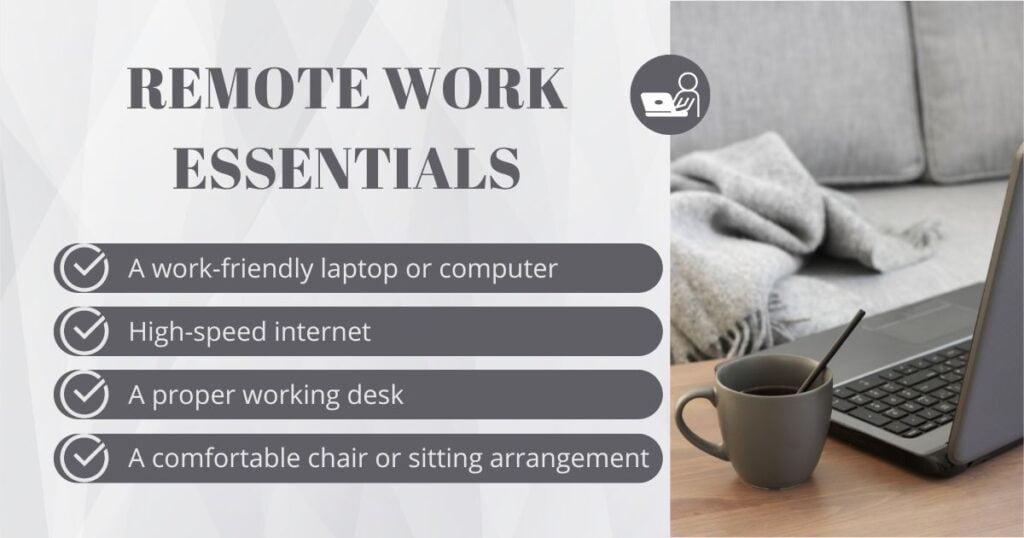Remote work opportunities have increased in recent years, especially since the Covid-19 pandemic.
Looking for remote work opportunities? Look no further! With the rise of remote work in recent years, especially due to the Covid-19 pandemic, there are now more options than ever to work from the comfort of your own home. This is where staffing agencies come in handy. Acting as a bridge between employers and job seekers, staffing agencies offer a wide variety of remote job options across various industries. Not only do they save you time in your job search, but they also increase your chances of getting hired. With reputable staffing agencies like Robert Half, Kelly Services, Snelling, and many more to choose from, you’ll be sure to find the perfect remote job that suits your skills and interests. From call center and data entry positions to roles in marketing, healthcare, and technology, the possibilities are endless. Plus, staffing agencies provide support for job seekers throughout the screening process, making your remote job hunt a smooth and successful journey.

Overview of Remote Work Opportunities
Remote work has become increasingly popular in recent years, with more and more individuals opting for the flexibility and convenience it offers. The rise of remote work has been further accelerated by the impact of the Covid-19 pandemic, which has forced companies and employees to adapt to new work arrangements. In this article, we will explore the various remote work opportunities available, the benefits of remote work, and how staffing agencies can play a crucial role in finding remote jobs.
Increase in Remote Work Opportunities
The demand for remote work has seen a significant rise in recent years, and this trend has been further amplified by the global pandemic. Organizations have realized the benefits of remote work, such as reduced overhead costs, increased productivity, and improved employee satisfaction. As a result, more companies are offering remote work opportunities to attract top talent and adapt to the changing work landscape.
Impact of Covid-19 on Remote Work Opportunities
The Covid-19 pandemic has had a profound impact on the way we work. As social distancing measures were implemented worldwide, organizations had to quickly transition their workforce to remote setups to ensure business continuity. This sudden shift has led to a greater acceptance and normalization of remote work. Companies that may have been hesitant to embrace remote work in the past have now witnessed its viability firsthand, which has opened up even more remote work opportunities.
Benefits of Remote Work
There are numerous benefits associated with remote work. Firstly, remote work provides flexibility, allowing individuals to work from any location, whether it be from the comfort of their own homes or while traveling. This flexibility can greatly improve work-life balance and reduce commuting time and expenses. Remote work also offers increased autonomy and independence, allowing employees to structure their workday in a way that suits their individual needs and preferences. Additionally, remote work can lead to increased productivity, as employees often experience fewer distractions and have greater control over their work environment.
Finding Remote Jobs through Staffing Agencies
Staffing agencies are a valuable resource for individuals seeking remote work opportunities. These agencies act as intermediaries, connecting employers with job seekers and assisting in the job placement process. Staffing agencies have extensive networks and knowledge of various industries, enabling them to present job seekers with a wide range of remote job options.
Role of Staffing Agencies in Remote Job Placement
Staffing agencies play a crucial role in remote job placement. They actively seek out and establish relationships with employers offering remote positions, ensuring a steady stream of remote job opportunities. These agencies conduct thorough candidate screenings, matching job seekers with suitable remote positions based on their skills, qualifications, and preferences. By leveraging their industry expertise and connections, staffing agencies increase the chances of job seekers finding remote positions that align with their career goals.
Benefits of Using Staffing Agencies for Remote Job Search
Utilizing the services of a staffing agency for your remote job search offers several significant benefits. Firstly, staffing agencies have extensive knowledge of the job market and can provide valuable insights and advice throughout the job search process. They often have access to job openings that may not be publicly advertised, giving job seekers a competitive edge. Additionally, staffing agencies streamline the job application process by handling initial screenings, interviews, and negotiations on behalf of job seekers. This saves time and allows job seekers to focus on preparing for interviews and showcasing their skills.
Reputable Staffing Agencies for Remote Jobs
When it comes to choosing a reputable staffing agency for your remote job search, there are several well-established agencies to consider. Some notable staffing agencies include Robert Half, Kelly Services, Snelling, LaSalle Network, Randstad, Adecco, Kforce, Toptal, Express Employment Professionals, Motion Recruitment, Vaco, Aquent, and Manpower. These agencies have a proven track record of successfully placing candidates in remote positions across various industries.
Range of Remote Job Options
Remote jobs available through staffing agencies cover a wide spectrum of industries and roles. Some common remote job sectors include call center and customer service, data entry and administrative positions, marketing and sales, healthcare, technology and IT, and finance and accounting. Whether you’re interested in providing customer support, managing digital marketing campaigns, or analyzing financial data, there are remote job options available to suit a diverse range of skills and interests.
Staffing Agency Process for Remote Job Seekers
If you decide to work with a staffing agency for your remote job search, it’s important to understand the process involved. Staffing agencies typically have a screening process in place to assess the suitability of job seekers for remote positions. This may involve reviewing resumes, conducting interviews, and administering skill assessments. By thoroughly evaluating candidates, staffing agencies can ensure that only qualified applicants are presented to employers.
Support Provided by Staffing Agencies
In addition to screening job seekers, staffing agencies also provide support throughout the job placement process. They offer guidance and advice on resume writing, interview preparation, and skill development to maximize a candidate’s chances of success. Staffing agencies also act as a point of contact between job seekers and employers, facilitating communication and negotiations. This support helps alleviate the stress and uncertainties often associated with job searching, particularly in the remote work landscape.
Tips for Success when Working with a Staffing Agency
To make the most of your experience with a staffing agency, it’s essential to follow certain best practices. Firstly, ensure that your resume and cover letter are polished and tailored to highlight your skills and qualifications for remote positions. Be proactive in communicating with your agency and provide them with any updated information or changes in your job preferences. Additionally, be open to feedback and constructive criticism during the screening process, as this will help you improve your chances of landing a remote job. Finally, maintain a positive and professional attitude throughout the process, as this will reflect well on you as a candidate.
Popular Remote Job Sectors
Remote work opportunities span various industries, offering a range of job sectors to choose from. Some popular remote job sectors include call center and customer service, data entry and administrative positions, marketing and sales, healthcare, technology and IT, and finance and accounting. Each of these sectors presents unique remote job opportunities, catering to individuals with different skills and interests.
Call Center and Customer Service
Call center and customer service roles are among the most common remote job opportunities. Remote customer service representatives handle customer inquiries, troubleshoot issues, and provide support via phone, email, or chat. With advancements in technology, individuals can work remotely as call center agents, ensuring customer satisfaction from the comfort of their own homes.
Data Entry and Administrative Positions
Data entry and administrative positions are in high demand, especially in the remote work landscape. Remote data entry specialists enter and manage data for various organizations, while remote administrative assistants provide administrative support and perform tasks such as scheduling appointments and organizing documents. These positions can be ideal for individuals with strong attention to detail and organizational skills.
Marketing and Sales
Marketing and sales professionals can also find numerous remote job opportunities. Remote marketing specialists handle digital marketing campaigns, social media management, content creation, and more. Remote sales representatives, on the other hand, focus on reaching out to potential clients, generating leads, and closing deals. Remote roles in marketing and sales often offer flexibility and the opportunity to work with diverse clients and projects.
Healthcare
The healthcare industry has also embraced remote work, offering remote job opportunities for various roles. Telehealth professionals, including doctors, nurses, and therapists, can provide virtual medical consultations and support from anywhere. Remote medical coders and billers ensure proper coding and billing procedures are followed for healthcare organizations. Remote healthcare jobs allow professionals to make a positive impact on patients’ lives while enjoying the flexibility and convenience of working remotely.
Technology and IT
The technology and IT sector has long been associated with remote work. Remote software developers, web designers, IT consultants, and cybersecurity analysts are just a few of the many remote job opportunities in this field. As technology continues to advance, the demand for skilled remote IT professionals will continue to grow.

Finance and Accounting
Finance and accounting professionals are not exempt from remote work opportunities. Remote financial analysts, accountants, bookkeepers, and tax consultants can provide their expertise remotely by assisting organizations with financial planning, analysis, and reporting. Remote roles in finance and accounting allow professionals to work with clients from various industries while enjoying the flexibility and autonomy of remote work.
Challenges and Considerations of Remote Work
While remote work offers numerous benefits, it’s essential to acknowledge and address the challenges and considerations that come with this work arrangement. Being aware of these challenges can help remote workers proactively find solutions and ensure a successful remote work experience.
Work-Life Balance
One of the challenges often associated with remote work is maintaining a healthy work-life balance. Without the clear boundaries imposed by a physical office, it can be tempting to work longer hours, leading to burnout and a lack of separation between work and personal life. Remote workers must establish clear boundaries and prioritize self-care to maintain a healthy balance between their professional and personal responsibilities.
Communication and Collaboration
Effective communication and collaboration are vital in any work environment, but they can pose unique challenges in a remote work setup. Remote workers must rely on virtual communication tools and platforms to stay connected with colleagues and managers. It’s important to proactively communicate and ensure that everyone is on the same page to avoid misunderstandings and foster teamwork.
Self-Motivation and Discipline
Working remotely requires a higher level of self-motivation and discipline compared to a traditional office setting. Without direct supervision, remote workers must be self-driven and proactive in managing their time and tasks. Establishing a structured routine and setting clear goals can help remote workers stay focused and motivated in their work.
Potential Isolation
Remote work can sometimes lead to feelings of isolation and disconnection from colleagues and the broader work environment. Without regular face-to-face interactions, it’s important for remote workers to find ways to stay connected. Participating in virtual team meetings, engaging in online communities, and utilizing collaboration tools can help mitigate the sense of isolation and foster a sense of belonging.
Creating a Productive Remote Workspace
Creating a productive remote workspace is crucial for remote workers to stay focused and efficient. Designating a specific area for work, minimizing distractions, and ensuring proper ergonomics are important considerations when setting up a remote workspace. Creating a space that promotes productivity and well-being will contribute to success in remote work.
Skills and Qualifications for Remote Jobs
While remote work offers flexibility, it also requires certain skills and qualifications to thrive in this work arrangement. Remote workers must possess a combination of technical and soft skills to be successful in remote job roles.
Strong Communication Skills
Effective communication is crucial in remote work environments. Remote workers must be able to express themselves clearly and concisely through written and verbal communication. Being able to actively listen, ask questions, and provide feedback are also essential elements of strong communication skills in remote work.

Time Management and Organization
Remote workers must excel in time management and organization to meet deadlines and accomplish their tasks efficiently. They must prioritize their work, set realistic goals, and manage their time effectively to ensure productivity. Utilizing tools and techniques to prioritize tasks and manage time effectively is key to success in remote work.
Technical Skills and Proficiency
Remote jobs often require technical skills and proficiency, depending on the industry and job role. Proficiency in relevant software, tools, and platforms is essential for remote workers to carry out their responsibilities effectively. Staying up-to-date with industry trends and advancements is also important to remain competitive in the remote job market.
Self-Discipline and Motivation
Working remotely requires a high level of self-discipline and motivation. Remote workers must be self-starters and have the ability to stay on track, even without direct supervision. They need to be proactive in managing their workload, staying focused, and meeting deadlines. Developing self-discipline and motivation is crucial for remote work success.
Adaptability and Problem-Solving
Remote work often presents unexpected challenges and requires individuals to be adaptable and resourceful. Remote workers must have the ability to quickly adapt to changes in work processes or technology. They should be effective problem solvers, able to identify and address issues independently, and seek solutions collaboratively when necessary.
Ability to Work Independently
Remote work often involves working independently without constant supervision. Remote workers must be able to work autonomously, make decisions, and take ownership of their responsibilities. Being self-sufficient and accountable for their work ensures that remote workers can deliver results, even without immediate oversight.
Remote Work Trends and Future Outlook
Remote work is poised to continue its growth as a preferred work arrangement for individuals and organizations alike. Several trends and factors contribute to this continued expansion and shape its future outlook.
Continued Growth of Remote Work Opportunities
The demand for remote work opportunities is expected to continue growing in the coming years. The Covid-19 pandemic has accelerated the adoption of remote work, with companies recognizing its benefits and embracing it as a long-term work arrangement. As technology continues to advance, more industries will offer remote work options, creating a broader range of opportunities for job seekers.
Remote Work as a Preferred Work Arrangement
As more individuals experience the benefits of remote work, it is becoming a preferred work arrangement for many. The ability to work from anywhere and enjoy a flexible schedule is appealing to individuals seeking a better work-life balance. Remote work also appeals to organizations as it allows them to tap into a global talent pool and reduce costs associated with physical office spaces.
Technological Advancements and Remote Work
Advancements in technology will play a significant role in shaping the future of remote work. Tools and technologies that facilitate remote collaboration, communication, and project management will continue to improve and become more accessible. Virtual reality, artificial intelligence, and automation will likely revolutionize the way remote work is conducted, enabling even more complex tasks and industries to be performed remotely.
Potential Challenges and Solutions
As remote work continues to evolve, new challenges may arise. However, with effective solutions and proactive measures, these challenges can be overcome. Some potential challenges include ensuring productivity and accountability in a remote work environment, addressing cybersecurity concerns, and fostering social connections among remote teams. Organizations will need to invest in robust remote work policies, provide adequate training and support, and leverage technology to mitigate these challenges effectively.
Tips for Success in Remote Work
While remote work offers numerous advantages, it’s important for remote workers to be proactive and adopt effective strategies for success. Here are some tips to thrive in a remote work environment:
Establish a Routine and Schedule
Maintain a structured routine and set specific working hours to establish a sense of normalcy and keep your productivity levels high. This routine can include regular breaks, exercise, and dedicated time for personal activities.
Set Boundaries and Prioritize Self-Care
Set clear boundaries between work and personal life to avoid burnout and maintain a healthy work-life balance. Prioritize self-care activities such as exercise, hobbies, and spending time with loved ones to recharge and maintain overall well-being.
Maintain Regular Communication with Team
Stay connected with your colleagues and team members through regular communication channels. Utilize video conferencing, instant messaging platforms, and virtual team meetings to foster collaboration and maintain a sense of belonging.
Utilize Productivity Tools and Software
Leverage productivity tools and software to streamline your work processes, manage tasks, and stay organized. Project management tools, time-tracking apps, and communication platforms can help optimize your remote work productivity.
Continuous Learning and Professional Development
Invest in continuous learning and professional development to stay relevant and enhance your skills in the remote work landscape. Attend virtual workshops, webinars, and online courses to upskill and expand your knowledge base.
Conclusion
Remote work opportunities have experienced significant growth in recent years, with the Covid-19 pandemic further fueling this trend. Staffing agencies play a vital role in connecting job seekers with remote job opportunities, offering a wide range of options across various industries. Remote work offers numerous benefits such as flexibility, increased autonomy, and improved work-life balance. While remote work poses unique challenges, such as maintaining communication and productivity, with the right skills, qualifications, and strategies, individuals can thrive in remote job roles. As the future of work continues to evolve, remote work is expected to play an increasingly prominent role, offering individuals and organizations an attractive and viable work arrangement.




